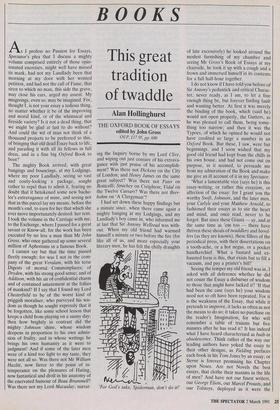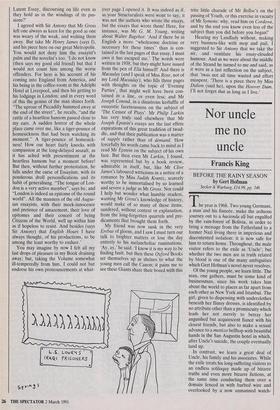BOOKS
As I profess no Passion for Essays, Spectator's plea that I discuss a mighty volume comprised entirely of those opin- ionated exercises, might well have missed its mark, had not my Landlady been that morning at my door with her wonted petition, and had not the call of Fame, that siren to which no man, this side the grave, may close his ears, urged my assent. My misgivings, even so, may be imagined. For, thought I, is not your essay a tedious thing, no matter whether it be of the improving and moral kind, or of the whimsical and fireside variety? Is it not a dead thing, that we might be glad at last to do without? And could the wit of man not think of a thousand projects to be preferred to this, of bringing that old dead Essay back to life, and parading it with all its fellows in full dress, and in a fine big Oxford Book to boot?
The mighty Book arrived, with great hangings and bouncings, at my Lodgings, where my poor Landlady, seeing so vast and costly-looking a package, sought rather to repel than to admit it, fearing no doubt that it betokened some new bache- lor's extravagance of mine, and seeing not that in this parcel lay my means, before the month's end, to earn for her that which she ever move importunately desired: her rent. I took the volume in the Carriage with me, to the Exchange, where I passed for a great savant or Know-all, for the work has been executed by no less a man than Mr John Gross, who once gathered up some several million of Aphorisms in a famous Book. I cannot say but that the time passed fleetly enough; for was I not in the com- pany of the great Verulam, with his terse Digests of mortal Commonplaces; of Dryden, with his strong good sense; and of Addison, with his air of confidential charm and of contained amazement at the follies of mankind? If I say that I found my Lord Chesterfield to be of the worst kind of priggish moraliser, who purveyed his wis- dom as though he sought expressly that it be forgotten, like some school lesson that keeps a child from playing on a sunny day; then how brightly in contrast did the mighty Johnson shine, whose wisdom deepens in proportion to his own admis- sion of frailty, and in whose writings he brings his own humanity as it were to judgment! And if some of the later men were of a kind too light to my taste, they were not all so. Was there not Mr William Hazlitt, now fierce to the point of in- temperance on the pleasures of Hating, now fantastical and droll in his anatomy of the enervated humour of Beau Brumrnell? Was there not my Lord Macaulay, narrat-
This great tradition of twaddle
Alan Hollinghurst
THE OXFORD BOOK OF ESSAYS edited by John Gross OUP, L17.95, pp. 680 ing the Inquiry borne by my Lord Clive, and wiping out just censure of his extrava- gance with just praise of his accomplish- ment? Was there not Dickens on the City of London; and Henry James on the same great subject? Was there not Pater on Botticelli; Strachey on Creighton; Vidal on the Twelve Caesars? Was there not Beer- bohm on 'A Clergyman'?
I had set down these happy findings but a minute since, when there came again a mighty banging at my Lodgings, and my Landlady's boy came in, who informed me at last that Sir Antony Wellread was with- out. When my old friend had warmed himself a minute or two before the fire (for like all of us, and more especially your literary men, he has felt the chilly draughts Tor God's sake, Spiderman, don't do it!' of late excessively) he looked around the modest furnishing of my chamber and seeing Mr Gross's Book of Essays at my chairside, he took it up with a cough and a frown and immersed himself in its contents for a full half-hour together.
I do not know if I have told you before of Sir Antony's pedantick and critical Charac- ter, never ready, as I am, to let a fine enough thing be, but forever finding fault and wanting better. At first it was merely the binding of the book, which (said he) would not open properly, the Gutters, as he was pleased to call them, being some- thing too narrow; and then it was the Typoes, of which he opined he would not have credited so large a number in an Oxford Book. But these, I saw, were but beginnings, and I soon wished that my good old friend had kept from the chills in his own house, and had not come out on purpose, as it seemed, to persuade me from my admiration of the Book and make me give an ill account of it in my Spectator.
`What a lamentable vice (says he) is this essay-writing; or rather this essayism, or affection of the essay: for I grant you the worthy Swift, Johnson, and the later men, your Carlyle and your Matthew Arnold, so fashioned their essays as to stir the heart and mind, and once read, never to be forgot. But since these Giants — ay, and at the same time as 'em too — there have thriven these shoals of twaddlers and birrel- lers (as they are known), these fillers of the periodical press, with their dissertations on a tooth-ache, or a hot negus, or a pocket handkerchief. What a bastard and ex- hausted form is this, that exists but to fill a vacuum, and pay a printer's bill!'
Seeing the temper my old friend was in, I asked with all deference whether he did not count the Essay a disburser of wisdom to those that might have lacked it? 'If that had been the case (says he) your wisdom need not so oft have been repeated. For it is the weakness of the Essay, that while it pretends to improve, it lacks as often as not the means to do so: it takes no purchase on the reader's Imagination; for who will remember a table of truisms but five minutes after he has read it? It has indeed what I have heard characterised as built-in obsolescence. Think rather of the way our leading authors have yoked the essay to their other designs, as Fielding prefaces each book in his Tom Jones by an essay; or Sterne is forever promising his Chapter upon Noses. Are not Novels the best essays, that clothe their maxims in the life of men? And have not our finest writers, our George Eliots, our Marcel Prousts, and our Tolstoys, deployed as it were the Latent Essay, discoursing on life even as they hold us in the windings of its pas- sions?'
I agreed with Sir Antony that Mr Gross left one always as keen for the good as one was weary of the weak, and wishing them away. But take Mr Henry James (says I), and his piece here on our great Metropolis. You would not deny him the essayist's palm and the novelist's too. `I do not know (then says my good old friend) but that I would not count him among the worse offenders. For here is his account of his coming into England from America, and his being in the coffee-room at the Ade1phi Hotel at Liverpool, and then his getting to his lodgings in London; and in every word of this the genius of the man shines forth. "The uproar of Piccadilly hummed away at the end of the street", he recalls, "and the rattle of a heartless hansom passed close to my ears. A sudden horror of the whole place came over me, like a tiger-pounce of homesickness that had been watching its moment." A tiger-pounce of homesick- ness! How our heart fairly knocks with compassion at the long-delayed assault, as it has ached with presentiment at the heartless hansom but a moment before! But then, without further protestation, he falls under the curse of Essayism, with its ponderous droll personifications and its habit of generalising. "The tongue of Lon- don is a very active member", says he; and "London is indeed an epitome of the round world". All the manners of the old Augus- tan essayists, with their mock-innocence and pretence of amazement, their love of epitomes and their conceit of being Citizens of the World, well up within him as if hopeless to resist. And besides (says Sir Antony) that English Hours I have always thought, of his productions, to be among the least worthy to endure.'
You may imagine by now I felt all my last drops of pleasure in my Book draining away; but, taking the Volume somewhat ill-temperedly from him, I could not but endorse his own pronouncements at what- ever page I opened it. It was indeed as if, as your Structuralists were wont to say, it was not the authors who wrote the essays, but the essays that wrote them! Here, for instance, was Mr G. M. Young, writing about Walter Bagehot: `And if there be in English a more "wholesome doctrine or necessary for these times" than is con- tained in the last pages of that essay, I must own it has escaped me.' The words were written in 1938, but they might have issued from the pen of Elia himself! And there is Macaulay (and I speak of Miss Rose, not of my Lord Macaulay), who fills three pages with thoughts on the topic of 'Evening Parties', that might well have been con- tained in a line, or even less; and Mr Joseph Conrad, in a disastrous kerfuffle of essayistic facetiousness on the subject of `The Censor of Plays'. Mr Philip Larkin has very truly said elsewhere that Mr Joseph Epstein's essays are the last effete expirations of this great tradition of twad- dle, and that their publication was a matter of supply rather than of demand. How forcefully his words came back to mind as I read Mr Epstein on the subject of• his own face. But then even Mr Larkin, I found, was represented but by a book review, admirable in itself, but, like Mr Clive James's laboured witticisms in a notice of a romance by Miss Judith Krantz, scarcely worthy to be immortalised by so learned and severe a judge as Mr Gross. Nor could I help but wonder what humble readers, wanting Mr Gross's knowledge of history, would make of so many of these items, sundered, without context or explanation, from the long-forgotten quarrels and pre- dicaments that brought them forth. My friend was now sunk in the very Erebus of gloom, and I saw I must turn our talk to brighter matters or lose the day entirely to his melancholiac ruminations. `Ay, ay,' he said. 'I know it is my way to be finding fault, but then these Oxford Books set themselves up as shrines to what the young men call the Canon; it pains me to see these Giants share their board with this trite little charade of Mr Belloc's on the passing of Youth, or this exercise in vacuity of Mr Symons: why, read him on Cordova, and by the end you know even less of the subject than you did before you began!'
Hearing my Landlady without, making very business-like with mop and pail, I suggested to Sir Antony that we take the air, and ventilate his essay-clouded humour. And as we were about the middle of the Strand he turned to me and said, as it were in a last reflection on the subject, that 'twas not all time wasted and effort misspent. 'There is a piece there by Miss Didion (said he), upon the Hoover Dam. I'll not forget that as long as I live.'



















































 Previous page
Previous page